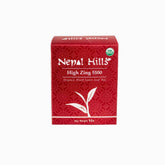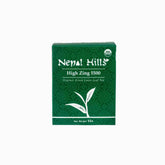Does Tea Have Benefits for Anxiety? Find Out Here
Understanding Anxiety and Its Impact on Daily Life
Anxiety is a normal reaction to stress. Anxiety is a common mental health condition that affects millions of people worldwide. It's characterized by persistent feelings of worry, fear, and unease that can interfere with daily activities. Anxiety symptoms can manifest both physically and emotionally, including rapid heartbeat, sweating, trembling, difficulty concentrating, and restlessness.
There are various causes of anxiety, ranging from genetic predisposition to environmental factors and life experiences. Traumatic events, chronic stress, and certain medical conditions can all contribute to the development of anxiety disorders. Common types include generalized anxiety disorder, panic disorder, and social anxiety disorder.
Understanding anxiety is crucial for effective stress management and overall mental health. While occasional anxiety is a normal part of life, persistent and intense anxiety may require professional help. Treatment options often include therapy, medication, or a combination of both, tailored to the individual's needs.
It's important to recognize that anxiety is treatable, and many people find relief through various coping strategies and lifestyle changes. Regular exercise, mindfulness practices, and maintaining a strong support network can all play significant roles in managing anxiety and improving quality of life.
The Science Behind Tea's Calming Effects
Tea's reputation as a soothing beverage is more than just folklore; it's backed by scientific evidence. The key to tea's calming effects lies in a unique amino acid called L-theanine, which is found almost exclusively in tea leaves. When consumed, L-theanine crosses the blood-brain barrier and influences neurotransmitter activity in the brain.
One of L-theanine's primary mechanisms is its ability to increase the production of GABA (gamma-aminobutyric acid), a neurotransmitter that promotes relaxation and reduces anxiety. Additionally, L-theanine has been shown to boost alpha brain waves, which are associated with a state of wakeful relaxation, similar to what one might experience during meditation.
Studies have demonstrated that the combination of L-theanine and caffeine, both present in tea, can enhance cognitive performance while simultaneously promoting a sense of calm. This unique balance helps explain why tea drinkers often report feeling alert yet relaxed.
Regular tea consumption has been linked to lower cortisol levels, indicating a potential role in stress reduction. The act of preparing and sipping tea can also trigger a relaxation response, further contributing to its calming effects. As research continues, the scientific community is uncovering more about how this ancient beverage supports mental well-being through its complex biochemical interactions with our nervous system.
Best Teas for Anxiety Relief
When it comes to managing anxiety, certain teas can offer natural relief. Chamomile tea is renowned for its calming properties, promoting relaxation and better sleep. Green tea, rich in L-theanine, can help reduce stress while providing a gentle energy boost. White tea, with its lower caffeine content, offers similar benefits without the risk of overstimulation.
Lavender tea is famous for its soothing aroma and ability to ease tension. Peppermint tea can aid in digestion and alleviate stress-related stomach discomfort. Passionflower tea has been traditionally used to reduce anxiety and improve sleep quality.
These herbal teas offer a range of benefits beyond anxiety relief, including antioxidant properties and potential immune system support. Incorporating these teas into your daily routine can be a simple yet effective way to promote overall well-being and manage anxiety symptoms naturally.
How to Incorporate Tea into Your Anti-Anxiety Routine
Incorporating tea into your anti-anxiety routine can be a soothing and effective way to manage stress. Start by exploring various tea brewing methods, such as steeping loose leaf teas in a teapot or using tea bags for convenience. Experiment with different types of tea known for their calming properties, like chamomile, lavender, or green tea.
Create a daily tea ritual to anchor your routine. This could involve setting aside a specific time each day to prepare and enjoy your tea mindfully. During this time, focus on the present moment, observing the color, aroma, and taste of your tea. This practice of mindful tea drinking can help quiet racing thoughts and promote relaxation.
Consider incorporating tea meditation into your routine. Sit comfortably, hold your warm cup of tea, and use it as a focal point for your meditation. Pay attention to the sensations of warmth in your hands, the rising steam, and the flavors as you sip. This can be an excellent way to combine the benefits of tea with mindfulness practices.
Develop daily tea habits that support your anti-anxiety efforts. For example, replace caffeine-heavy beverages with herbal teas in the evening to promote better sleep. Keep a variety of calming teas at your workplace for stressful moments. By integrating tea into different aspects of your day, you create multiple opportunities for moments of calm and self-care.
The Role of Caffeine in Tea and Anxiety
Caffeine, a natural stimulant found in tea, can have varying effects on anxiety levels. The caffeine content in tea differs depending on the type, with black tea generally containing more caffeine than green or white tea. While caffeine can increase alertness and improve focus, it may also exacerbate anxiety symptoms in some individuals, leading to jitters or restlessness.
For those sensitive to caffeine's stimulant effects, decaffeinated tea options are available. These teas undergo processes to remove most of the caffeine while retaining flavor and other beneficial compounds. However, it's important to note that even decaffeinated teas may contain trace amounts of caffeine.
The relationship between tea consumption and anxiety is complex. Some studies suggest that L-theanine, an amino acid found in tea, may help counteract caffeine's potential anxiety-inducing effects. Nevertheless, individuals prone to anxiety should be mindful of their caffeine intake, especially in the evening, as it can impact sleep quality.
To manage anxiety, consider monitoring your tea consumption, opting for lower caffeine varieties, or switching to herbal teas, which are naturally caffeine-free. Ultimately, finding the right balance depends on individual sensitivity and overall health goals.
Combining Tea with Other Anxiety-Reducing Techniques
While tea can be a powerful tool in managing anxiety, its effectiveness can be enhanced when paired with other relaxation techniques. Consider the caffeine content of your chosen tea, as some individuals may be sensitive to its stimulating effects. For those seeking a caffeine-free option, herbal teas like chamomile or lavender are excellent choices.
Incorporating deep breathing exercises while sipping your tea can create a synergistic calming effect. The act of slowly inhaling and exhaling helps activate the body's relaxation response, complementing the soothing properties of tea. Additionally, aromatherapy can be seamlessly integrated into your tea ritual. The scent of essential oils like lavender or bergamot can further promote relaxation and reduce stress levels.
For a more holistic approach to anxiety management, consider practicing yoga or mindfulness meditation in conjunction with your tea consumption. These practices can help center your thoughts and promote a sense of inner peace. By combining tea with these various techniques, you create a comprehensive strategy for managing anxiety that addresses both physical and mental aspects of well-being.
Remember, everyone's experience with anxiety is unique, so it may take some experimentation to find the perfect combination of tea and relaxation techniques that works best for you. Embrace this journey of self-discovery and be patient as you develop your personalized anxiety-reducing routine.
Potential Side Effects and Precautions
While herbal supplements can offer numerous health benefits, it's crucial to be aware of potential side effects and take necessary precautions. Herbal interactions with prescription medications can occur, potentially altering the effectiveness of either substance or causing unexpected reactions. Some herbs may conflict with certain medications, leading to adverse effects or reduced efficacy.
Allergies to specific herbs or their components are also possible, and individuals with known allergies should exercise caution when trying new herbal products. Pregnant women should be particularly vigilant, as some herbs can affect fetal development or induce contractions. It's essential to thoroughly research any herb before use and consider potential pregnancy considerations.
To ensure safe usage, always consult with healthcare providers before incorporating herbal supplements into your regimen. They can provide personalized advice based on your medical history, current medications, and individual health needs. Healthcare professionals can also help identify potential risks and recommend appropriate dosages or alternatives if necessary.
By staying informed and seeking professional guidance, you can maximize the benefits of herbal supplements while minimizing potential risks.
Conclusion: Embracing Tea as a Natural Anxiety Management Tool
Various types of tea, from calming chamomile to L-theanine-rich green tea, provide unique benefits for stress relief. The act of brewing and sipping tea itself can be a meditative practice, encouraging moments of pause in our busy lives. Moreover, the antioxidants and other beneficial compounds found in tea contribute to overall well-being, indirectly supporting our ability to cope with anxiety.
While tea should not be considered a substitute for professional mental health care, it can be a valuable addition to a holistic approach to anxiety management. By incorporating tea into our daily routines, we can harness its natural stress-relieving properties and create moments of tranquility in our increasingly hectic world.
As with any lifestyle change, it's essential to listen to your body and consult with healthcare professionals when necessary. Embracing tea as a tool for anxiety management can be a simple yet effective step towards improved mental health and a more balanced life.
Compiled by:
Bhaskar Dahal
2nd Generation Tea Entrepreneur
Founder and C.E.O, Nepal Hills Tea Inc.





